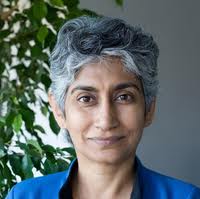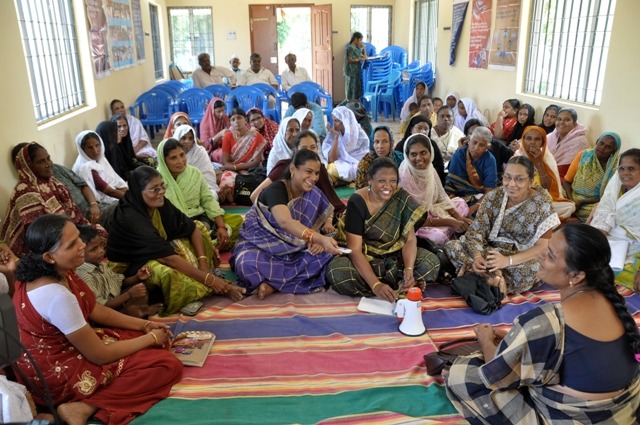A documentary on the Tamil Nadu Women’s Jamaat explores its origins, scope, power and decision-making process. The film looks at the group’s evolution, introducing its founder and other core members.
“Even if you feel flattened like a noodle, be strong and fight,” one woman exhorts another in “Invoking Justice,” a documentary about the determined work of the first Muslim women’s committee in Southern India.
The subject of the encouragement appears unconvinced; she has approached the committee to ask for help securing a divorce after being worn down by years of her husband’s abuse. But this group, which has grown its ranks to 12,000 members in the nine years since its inception, hasn’t gotten there by indulging apathy, for no one will step up to defend women in this Tamil Nadu community but themselves.

Director Deepa Dhanraj anticipates the many questions that might arise for non-Muslim or non-Indian audiences as she introduces the core members of the Tamil Nadu Muslim Women’s Jamaat. But she doesn’t rush to answer them. Instead the film’s procedural-like structure reveals the TNMWJ’s evolution.
How did this resolute group of women come together? What made them think they could successfully challenge the patriarchal status quo? How have they managed to keep their liberating activities from being squelched, not least of all within their own households?
One answer to that first question, of TNMWJ’s formation, emerges from the tension over the name itself. Men, explains the group’s founder Sharifa Khanam, are inordinately threatened by women’s appropriation of the word “jamaat.”
The word is flexible, with different meanings in various Muslim sects. In Pudukkottai, Tamil Nadu, it’s traditionally an all-male rule-making body that issues judgment on a range of domestic issues excluded from the state’s purview. It’s come to mean unchallenged male power over everything from eligibility for marriage and divorce, to rampant domestic abuse, to administration of dowry (a local atavism that’s not found in Sharia).
The women’s jamaat, however, cannot act solely as de facto judge and jury, both because its power is limited, and because its scope is broader. Its members have to form a new model for accruing power and intervening in community relations.
They do it by extending their work beyond basic investigation, becoming amateur marriage counselors, psychologists, lobbyists, personal coaches, and mediators. And as they negotiate among various parties, pressuring local officials with media exposure, or working closely with female police officers, they also develop shared strategies. Each case the women take on presents an opportunity to add to their collective knowledge and refine their skills.
In an early scene, a mother tells of not being allowed to see her married teenage daughter when the girl is on her deathbed. It seems unlikely that the women’s jamaat will be able to help prove the family’s suspicion that her in-laws burned their daughter to death. But in the moments after hearing the mother’s mournful tale, one of the women’s jamaat members addresses the entire group to highlight the lesson: never allow the men’s jamaat to convince you to disown your daughters, lest you lose your access.
In another case, of the woman petitioning for divorce, TNMWJ members insist on protocol that sounds like it’s been learned through defeat.
“Write your complaint,” Khanam tells the woman. “Also write what action you want us to take. We need it for our records, in case your husband challenges us. “
In one particularly poignant distillation of the group’s decision-making process, an elder says, “Our hearts ask our minds, is this right? The answer just rises to our lips. We don’t talk in private. It’s discussed openly. A common decision emerges.”
Sometimes, that common decision doesn’t conform to Sharia, which the women in this community point out they know as well as the men. At other times, the women bristle against the way that civil law proceedings in a case infringe on the community’s standard of a righteous outcome. This is a line of reasoning that an outsider would expect from the men’s jamaat, and it is one of the refreshing moments in which Dhanraj’s characters do not fit into convenient archetypes.
Take TNMWJ founder Khanam. She’s modern and educated; she attended college in Delhi. (Still, it wasn’t until she worked as a translator at a women’s conference that she envisioned the paradigm shift that inspired her to launch the women’s jamaat). There are few hijabis in this community. Nor is the women’s jamaat movement propelled by young and socially-networked activists like the ones that endured harassment in public squares during the Arab Spring.
The movie doesn’t avoid tropes entirely, including that familiar ring of Azaan in its establishing scenes, as if without the call to prayer a community might not be identifiably Muslim.
“Invoking Justice” manages not to feel freighted with tragedy, despite the sobering nature of the cases being adjudicated. The women’s vitality and vernacular enliven their jokes about nervous male offenders and boring sex that should instead be like the “spicy pickle” to the essential food of love.
“Invoking Justice” screened at this month’s CAAM Fest 2013, and a significant portion of the film can be watched here.
You can follow Nishat Kurwa on Twitter @nishatjaan.













